Just like the rest of our physical health, pelvic health changes as we age. A common problem for a lot of women around the time of menopause is urine leakage. This can happen when we laugh, cough, sneeze or jump, but for some people it can be a more regular occurrence.
In fact, pelvic floor dysfunction is something that affects many women, and we don't talk about it enough. A 2022 study showed that up to 50% of women will suffer a pelvic organ prolapse in their lifetime - and this could be avoided for a lot of us by doing regular pelvic floor exercises and/ or using one of the best pelvic floor trainers like the ones we've tested below.
And it works! There's strong evidence that exercising these muscles, just as we should be exercising the other muscles in our body, will help them stay strong, toned and in turn, urinary leakages and the possibility of prolapse are both greatly reduced. A pelvic floor trainer does just that; it helps you to train and tighten those specific muscles and build a greater mind muscle connection. Use a pelvic floor trainer to find where those muscles are and how to use them, then you'll see huge results.
Scroll to the bottom of the article for expert insight and advice from Dr Masarat Jilani, AKA the Selfcare Doctor, who specialises in pelvic and sexual healthcare for women.
Best pelvic floor trainers at a glance
What is the pelvic floor and why should I train it?
The pelvic floor is a sort of hammock of muscles that support the bladder, uterus and rectum. Both men and women have pelvic floor muscles, and it's always useful for men to do pelvic floor exercises too. However, it's more important for women.
If we have children, the baby puts a high level of pressure on the pelvic floor muscles, which are usually sitting under baby's head, supporting everything. They take a battering, in short. And the more children we have, the more pressure they have.
Whether we have children or not, there's also the issue of ageing and gravity at play. Over time, our muscles weaken, and things start to sag. Yes, that sounds awfully depressing, but it needn't be! I can't stress enough how important it is to keep working those pelvic floor muscles. They have a myriad of important jobs to do, including:
Providing support: A weakened pelvic floor can lead to prolapse. This is where one of the organs in the pelvis can drop down into the vaginal canal or even outside the body. Whilst not life threatening, it does cause a lot of issues, stress, and can be painful.
Helping with continence: These are the muscles that help us stop leaking urine or breaking wind at inappropriate times. Weak pelvic floor is what leads to urinary leakage when couching, sneezing, laughing or jumping for a lot of women. Although not dangerous, it can sabotage confidence, make us worry about being in certain social situations and cause distress.
Sexual function: Menopause can cause painful sex as the vagina becomes dryer. This is easily treatable with vaginal estrogen or using a good lubricant, but the pelvic floor also plays a part. These muscles help with arousal and orgasm.
How to choose a pelvic floor trainer
The great thing about a pelvic floor trainer is that you can use them anytime — if you've got a sink full of washing up to do or even when you're reading a book.
When it comes to choosing one, there's a wide range and several factors to consider. Pelvic floor trainers range from simple Kegel weights to high tech devices with a connecting app. Consider your budget but also be mindful of the fact that if you are having leakage issues or think you may be at risk of prolapse, it's worth investing in a product that will really help - and unfortunately these often come at a price.
Above all, you want your pelvic floor trainer to be:
-
Comfortable
-
Effective
-
Easy to use
Different types of pelvic floor trainers
Kegel weights - These are the most simplified form of pelvic floor trainer, and usually the least expensive. They are weighted balls (sometimes egg-shaped) that you insert into the vagina and squeeze. They come in different weights for you to use as function increases. They're best suited to those with light-medium pelvic floor dysfunction, as you need to be able to contract the muscles in some way.
Electrical therapy - Usually the more expensive end of the pelvic floor trainer market, but can be particularly good for women experiencing pelvic floor issues due to menopause as they can also help with dryness (a common menopause symptom). They work by sending an electrical impulse or heat to the muscles, stimulating them to action.
Biofeedback - These pelvic floor trainers work by an app which guides you through the exercises with the weights inside you. This is particularly helpful for identifying where the muscles are and how they work.
Here, we've rounded up some of the most highly reviewed pelvic floor trainers on the market. So, whether you need reminding how to get those muscles going again or ensure you're doing the exercises correctly, then one of the devices below could help.
How we tested the best pelvic floor trainers
We've asked a range of women who are experiencing pelvic floor issues to test the following pelvic floor trainers for us. They've used them consistently over a number of weeks and have monitored their pelvic floor function closely for signs of improvement. All our reviews are honest and we include positive and negative comments.
We have also included a round up of other pelvic floor trainers on the market that have very favourable customer reviews.
The best pelvic floor trainers 2025 tried and tested
Tested
The Joylux vaginal rejuvenation device, from Issviva, claims to offer 91% less dryness, 95% more tightness, 90% better bladder control, and 89% less pain with intercourse. All these issues are very common in perimenopausal women, or those post-menopause too. Bladder weakness is a particular concern.
The device works by using light technology, vibration and heat to stimulate collagen and elastin production, as well as stimulating blood flow to the area. Our tester, a 40 year old mum of 4, felt that the Issviva was well packaged and easy to get to grips with: "The packaging and product were really nicely presented, and it was very easy to set up.
The quick start guide was brilliant but you also had the instruction manual before hand to read through the finer details and refer back to if needed."
She used it over 10 weeks, hoping it would help the issues with continence she's been having since last giving birth 2 years ago. She did say "My only surprise was it got quite warm!" But that's to be expected since it uses electrical/ heat therapy. But it's not painful in any way, she said. "It was comfy to use so no issues there, which was good."
And best of all, she noticed a real difference: "I’ve been using it every day for 10 minutes. After the first week I felt the muscles being tighter whilst in use, and after two weeks of use I did feel an improvement particularly if I needed the toilet desperately, I felt I was holding everything in much better.I will definitely keep using this product as I believe long term use will give the greatest improvement."
It's not cheap, but we really do think it is a worthwhile investment if you're having issues with bladder weakness, dryness or pain during intercourse.
Pros
- Easy to set up, with clear instructions
- Comfortable to use
- Results in as little as one week
Cons
- Expensive, but we really feel it's worth the price point
Tested
Best pelvic floor trainer with an app
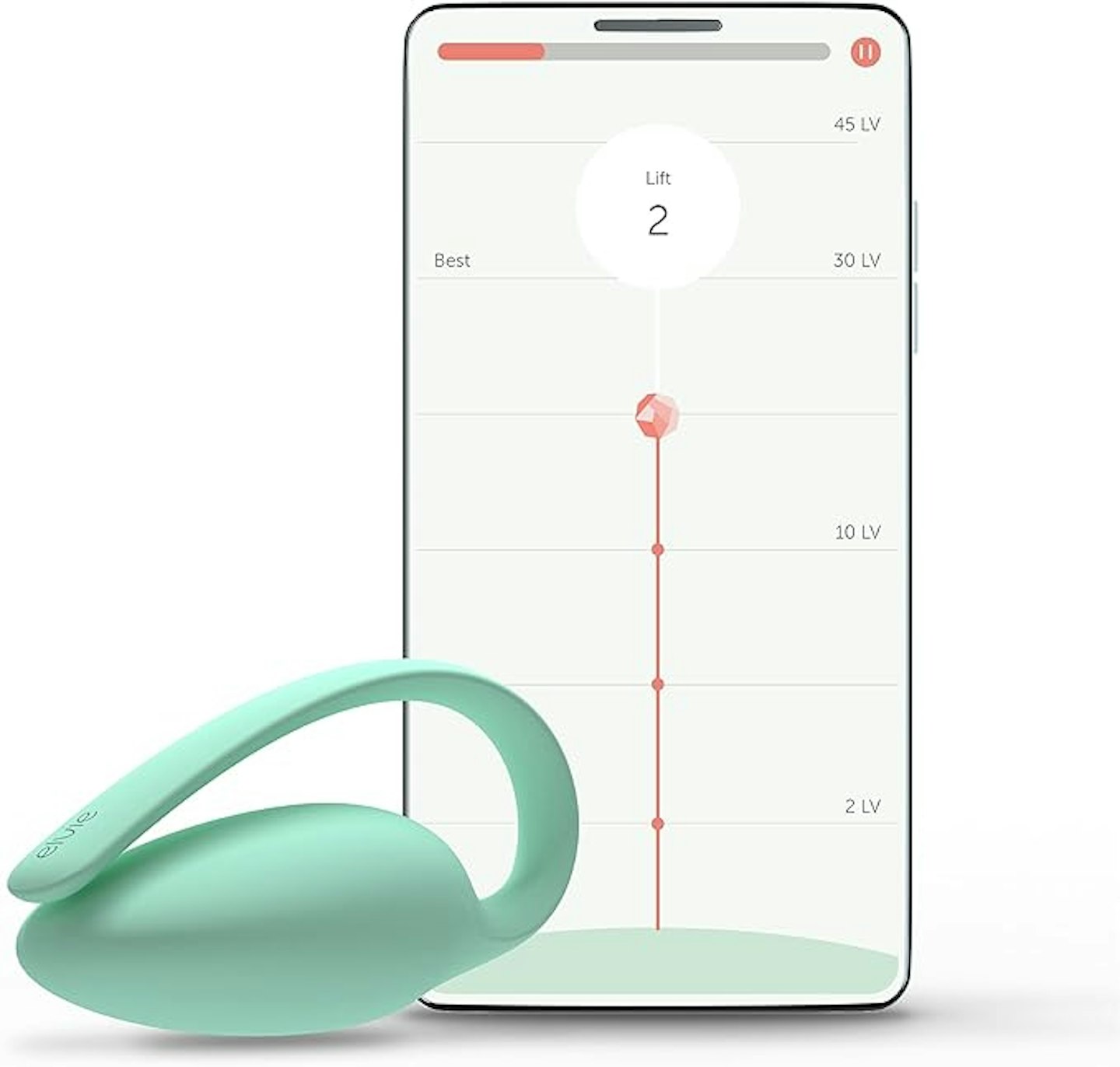
The Elvie Pelvic Floor Trainer connects to an app for pelvic floor exercises, giving you real-time feedback as you exercise and personalised exercises, and our tester - a mum in her 40s - found the app to be very useful in guiding her through what to do:
"If you’re looking for an accurate way to track your pelvic floor exercises then this is a good choice. The device sits in the vagina, with 1cm of tail inside, leaving the rest out. It fits in very easy, but make sure it’s in a good position as the app won’t let you begin an exercise otherwise.
It’s extremely intuitive and the app has always worked perfectly for me. No glitches.I thought it was great that a caution pop-up appeared to inform me that I was pushing downwards instead of upwards. In fact, the Trainer stopped working until I started pushing correctly again."
Made with medical-grade silicone, it's waterproof and comfortable to use. Its compact design and easy setup make it convenient for daily use, fitting seamlessly into your daily routine, and it really works.
Our tester noticed the effects after around 6 weeks of use, which has mad a vast difference to the quality of her daily life:
"After a vaginal birth with my second child, I suffered with incontinence and this shot my confidence. Now I’m able to do things like run again without the feeling of gushing from my vagina."
Pros
- App guides you through each exercise and helps you to improve your technique
- Reminders to complete exercises
Cons
- You will require a smartphone to get the full benefit
Tested
Best pelvic floor trainer for incontinence
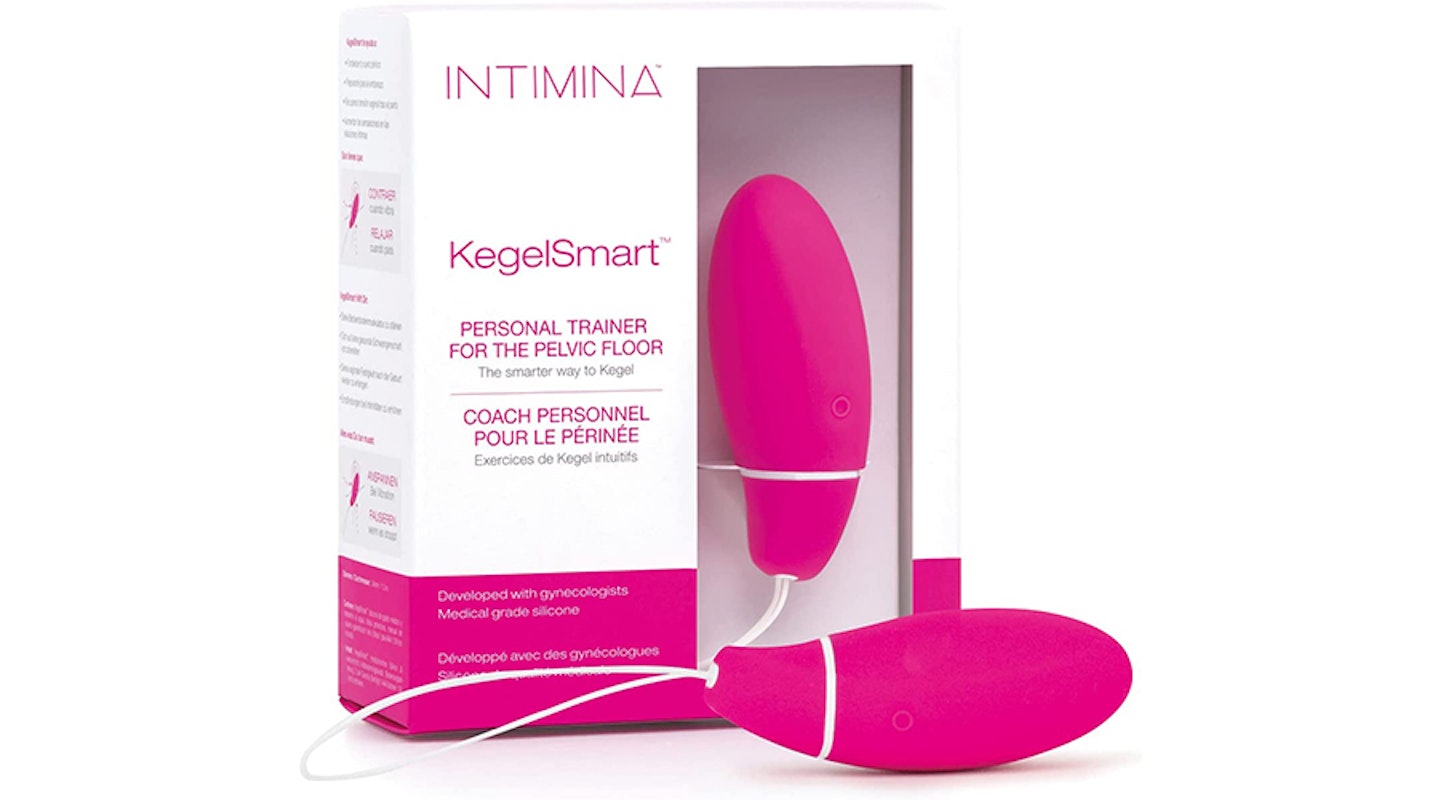 Intimina/Amazon
Intimina/AmazonThe Intimina pelvic floor trainer works in a similar way to the Elvie but it’s around a third of the price. The device pairs with an app to guide you through each exercise so you can get a good sense of whether you’re doing it correctly.
Our tester felt ""The device is easy to set up, with clear instructions. The programme lasts for 5 minutes and clearly indicates when it’s over. It’s not uncomfortable to use at all and is very quiet and discreet."
We like that the device intuitively adapts to your body, adjusting the intensity as needed, so you don’t need to fiddle about with different weights or changing devices. Our tester appreciated this aspect of the trainer, saying:
"The sessions are extremely easy to follow. You are instructed to contract your muscles along with the pattern of vibrations. The programmes alter in line with your muscle strength to gradually improve your pelvic floor over time."
Some users felt the battery life was short, while others said they couldn’t really feel the vibrations, so I’d suggest it might be more suitable for those who already have a relatively strong pelvic floor – prevention as opposed to cure, shall we say.
However, the woman testing this one did say it made a difference to her: "I loved how effective it was and how easy it is to use, with just a five-minute daily routine to strengthen pelvic floor muscles."
Pros
- Automatically adapts intensity for each tightening routine
- Uses gentle vibrations to guide you through each pelvic floor exercise
Cons
- Some reviewers felt the battery life was short
Tested
Best pelvic floor trainer for beginners
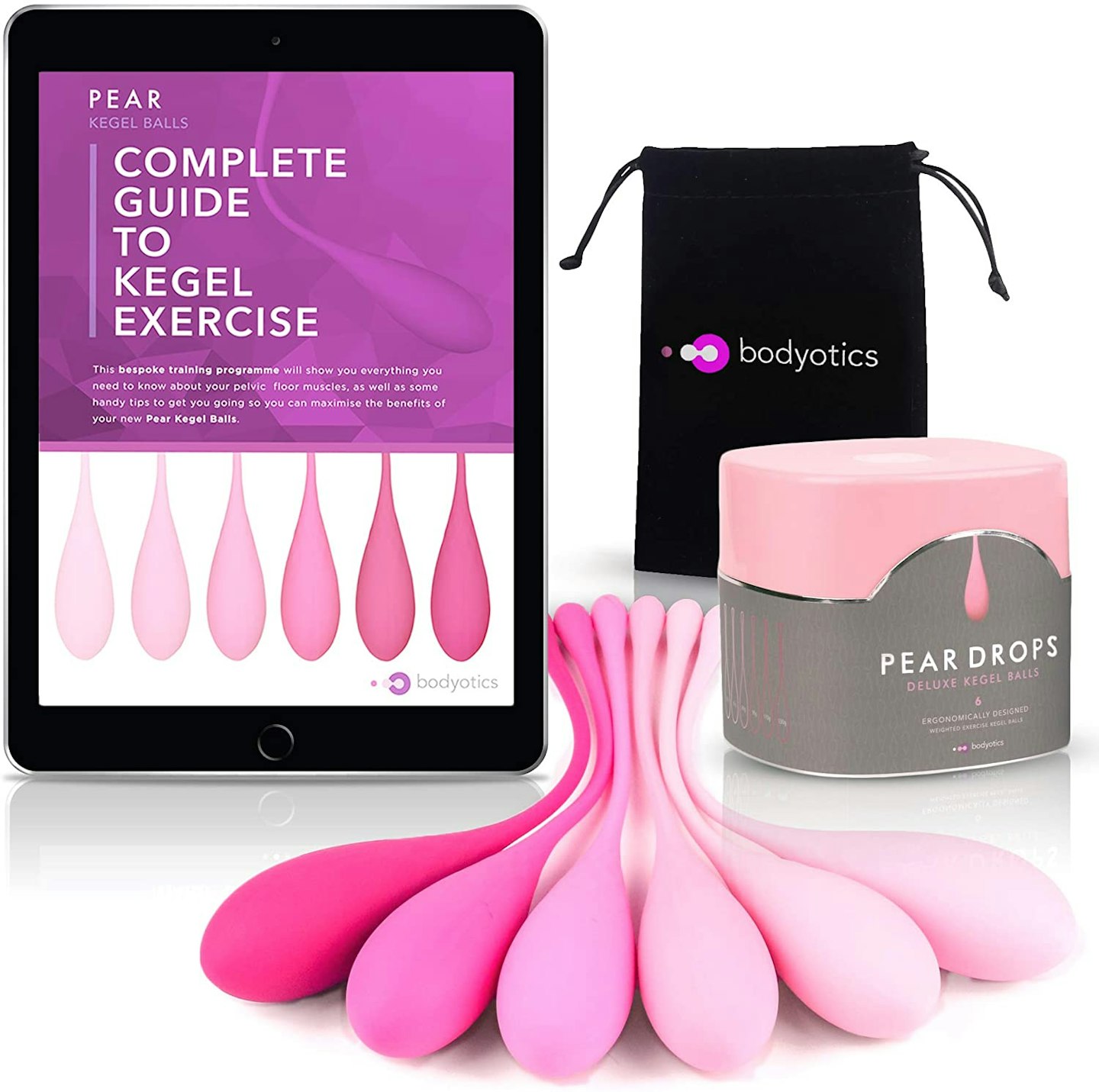 BodyoticsAmazon
BodyoticsAmazonIf you’re a complete beginner to pelvic floor training, these are the weights for you. This set has six weights included, ranging from 50g to 130g, so you can start with the lightest ones and move up from there, just like you would with dumbbells in the gym.
Our tester also felt that these weights had a benefit even when not being used: "These weights enable you to contract exactly the right muscles, and so even when you don't have the weights in, you can do your pelvic floor exercises much more effectively because you know where to squeeze and how it should feel!”
They’re a little more expensive than other similar products on the market, but reviews all praise the high quality of the product so in my opinion, it’s worth paying the extra. The soft silicone makes them easy to clean, and if insertion is a problem at all then you’ll be able to use water-based lubricant to help.
Our reviewer found them extremely effective in a. ver short space of time:
"I found this improved my pelvic floor function and vaginal health after just 2 weeks of use, which is amazing."
Pros
- Includes six silicone weights for progression
- Hypoallergenic and easy to clean
Cons
- Some reviewers wished they were heavier, but we think they're perfect for beginners
Tested
Best electronic pelvic floor trainer
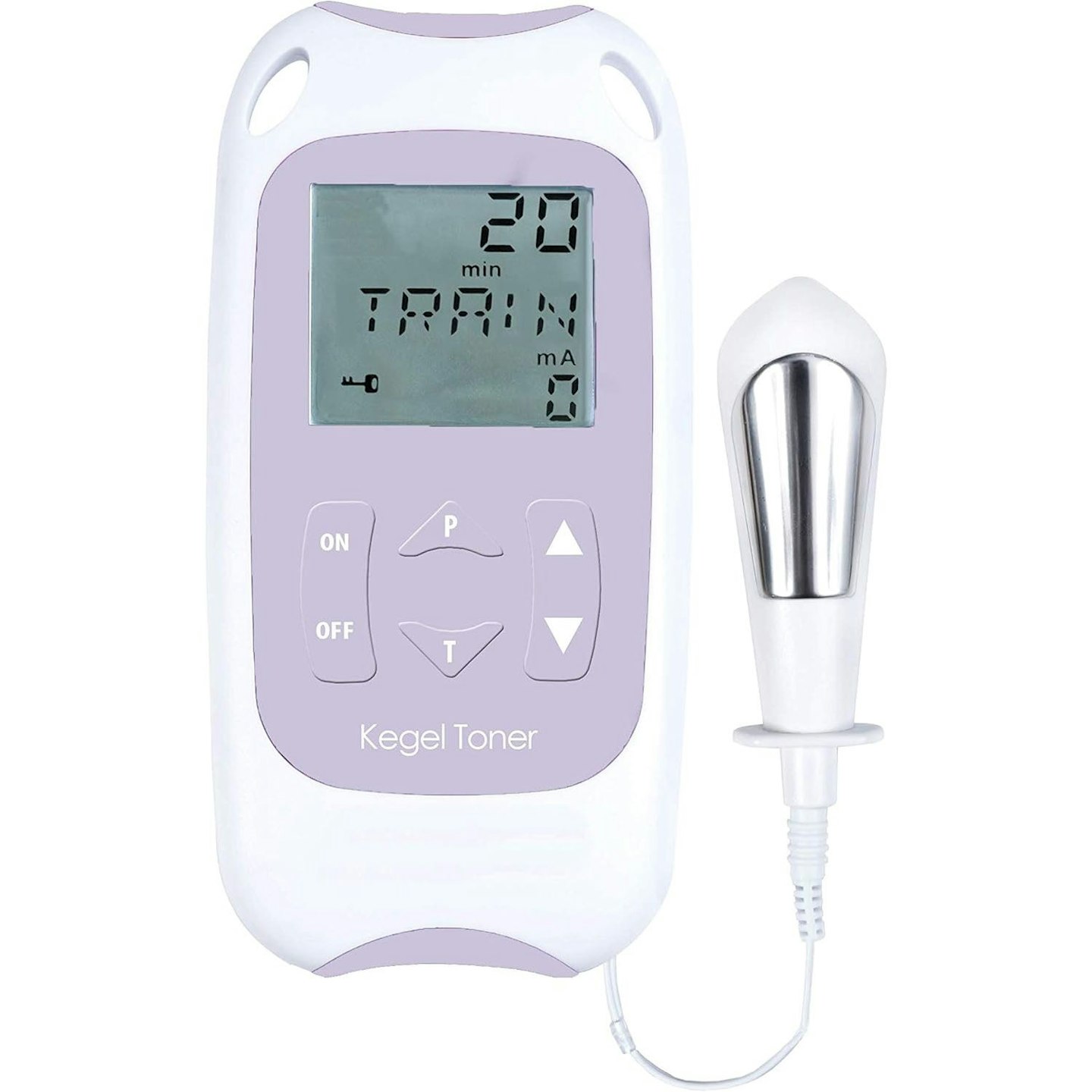 TensCare/Amazon
TensCare/AmazonThis tenscare Kegel Toner provides relief via a tampon-shaped probe. It uses gentle electrotherapy to stimulate pelvic floor muscles into regaining their strength and flexibility and delivers electrical impulses which target the correct location.
There’s different programmes to use according to your needs, such as a specific one for stress incontinence, and different time settings so you can start with just a few minutes and work up from there.
Our tester initially found it a bit strange, saying: "The thought of using an electrode is slightly off-putting compared to other pelvic floor toners and the instructions suggest finding the level that is uncomfortable and dropping it by one point (the levels go from 0-100)."
"I wouldn’t say that I’ve been setting it to a particularly high level, certainly not an uncomfortable one, but it’s at one where I can feel it working without worrying about it being painful."
It's easy to use and follow along with, but a bit fiddly:
"To use, you inset the probe and then find your correct level, but you do have to press the plus button that many times - I got up to level 68, for example, and that's quite a bit of pressing! The pulse starts and you’ll feel it working for a few seconds before it goes into the rest phase. It then ramps up again – you’re supposed to work with it, breathing in and pulling your muscles up as the machine does and relaxing during the rest period."
The device is silent and comes in a discreet bag so you can take it with you if travelling. The wand is easy to clean, and overall, I feel this offers good value for money. Some reviewers felt the battery life was short, but that seems to be an issue with many pelvic floor trainers, not just this one.
It works, as our tester discovered: "I was skeptical whether this would work, but I went for a run the other day with no leakage! I could feel my muscles working much better."
Pros
- Intensity goes up in small steps
- Discreet as the device is silent
Cons
- Some reviewers felt it used a lot of battery so had to replace them often
Tested
The plusOne Kegel trainer offers five different levels of vibration and is made out of easy to insert soft silicone. It's fully waterproof and compatible with water based lubricants so you can use it anywhere.
Our tester would agree with those points, saying: "The device itself is easy to insert and not too big. As you squeeze around it, the lights on the remote increase and so does the vibration. It's your aim to get them all to light up. I quite like that as I'm ridiculously competitive with myself!
I've been using this for a couple of weeks now and have definitely seen a big improvement."
Whilst our tester did love the effectiveness of the product, stating: "I've been using it every day and can notice an improvement in my ability to locate and squeeze the muscles."
She did have one issue: "It charges quickly, but the instructions are wrong. It says you use the double ended charger, connecting the device and the remote to one another, but the charger included is actually a USB charger, you plug it into a port and then into the device or the remote - you can't plug it into both. It's a small gripe, but it took me a while to figure out that it was wrong."
Pros
- 5 different levels
- Remote feedback to indicate the strength of exercise - you try to light up all the lights
- Quick-charge
Cons
- Charging instructions are incorrect
Other pelvic floor trainers available
Best pelvic floor trainer exercise balls
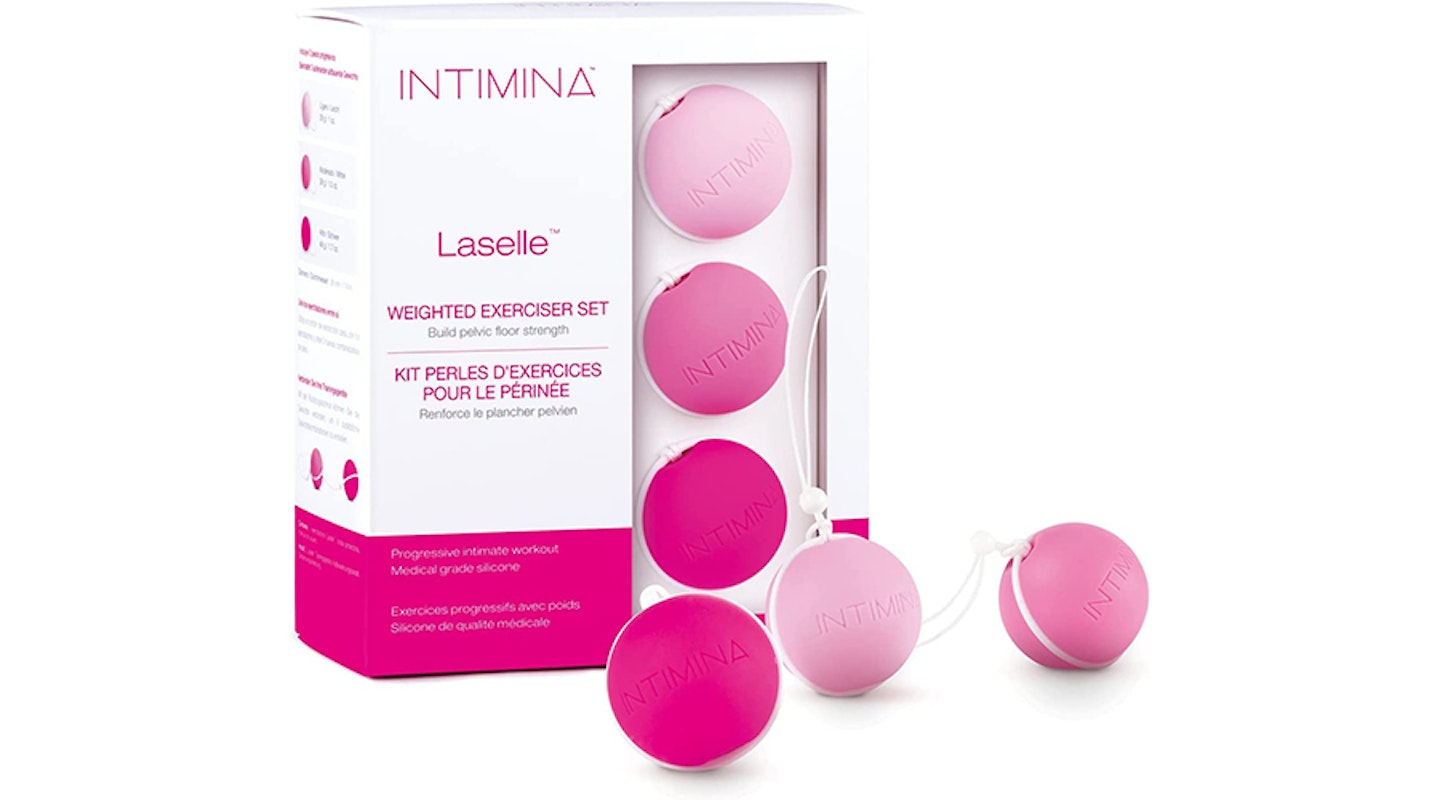 Amazon
AmazonThese Kegel balls simple — just pop one in and go about your normal day. Seriously! I know it sounds like that won’t be possible, but no one will know you’re using one and you’ll get a great pelvic floor workout.
There are three different balls to use for different resistance levels, suitable for beginners to more advanced users and they’re designed for optimal fit. They emit small vibrations whilst in use so you can feel them working.
Customers have commented that they’re easy to use, though not as easy to clean as some of the other devices on our list. Reviewers like that they don’t have to think about them and can just carry on with other things – the very definition of multi-tasking!
Pros
- Can be used individually or combined to create up to six weight combinations
- Made for optimal fit as they are spherical-shaped
Cons
- Some reviewers wished they were easier to clean
Best pelvic floor trainer for fun exercises
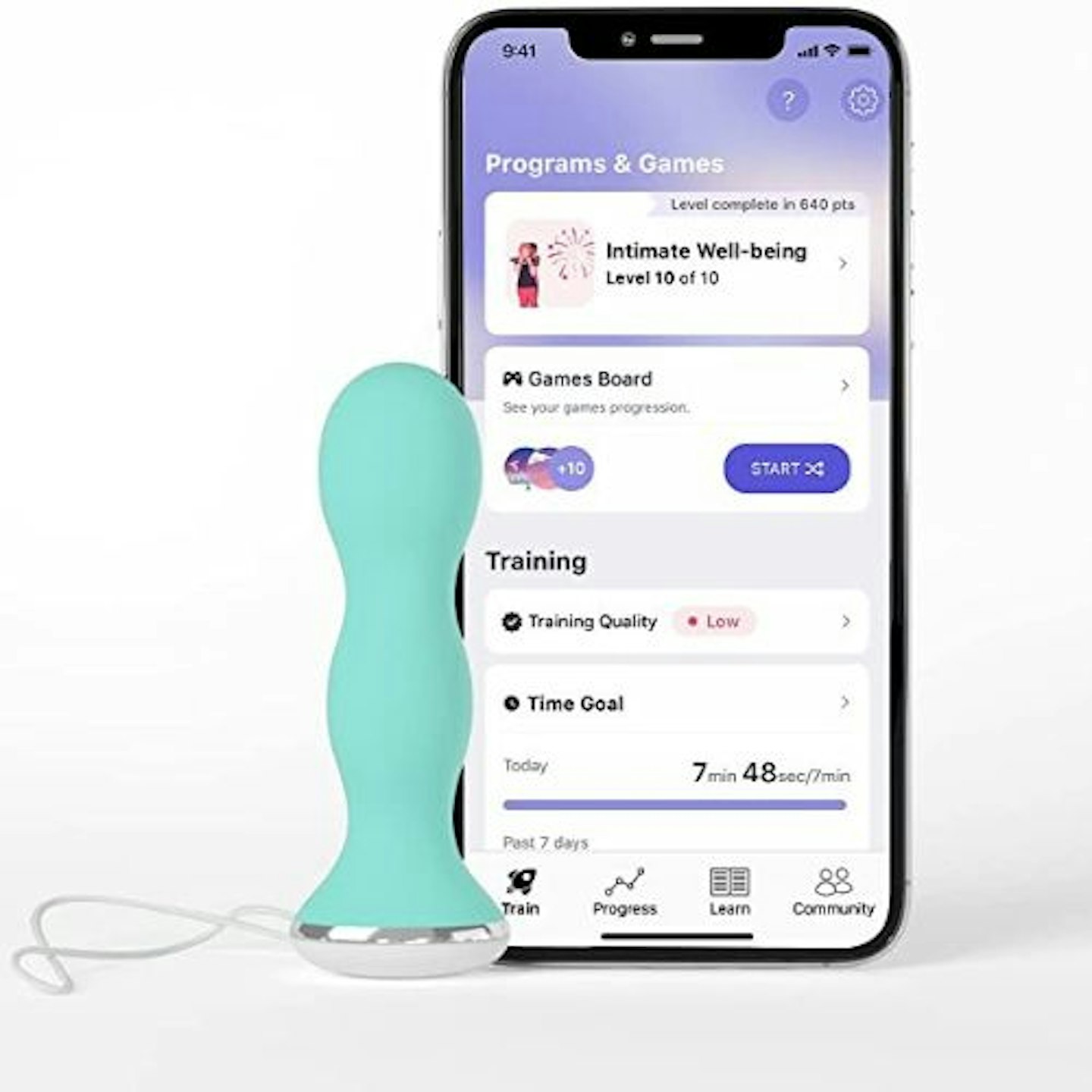 Perifit/Amazon
Perifit/AmazonThe Perrifit offers a range of fun exercises that are a bit different to other trainers. You just need to connect the probe to the app via Bluetooth, and you can watch your pelvic floor contractions in real-time.
Do stick with it, though. One customer noted that she didn’t feel any improvement in the first week, the second week she felt there may have been a slight improvement and then by the time a month had passed she noticed there were no more leaks when she was walking uphill. Consistency is key!
The device is fairly pricey, but most feel it’s worth it, and the different variety of exercises and games that the app offers makes it stand out. If you get bored easily, you’re more likely to stick at this one. It's perfectly fine to use everyday, and we would agree that the Permit is worth it.
Pros
- Fun and interactive exercises
- Equipped with a dual pressure sensor to ensure maximum effectiveness
Cons
- Some reviewers felt it was expensive for what it is
Best pelvic floor trainer for hard-to-reach muscles
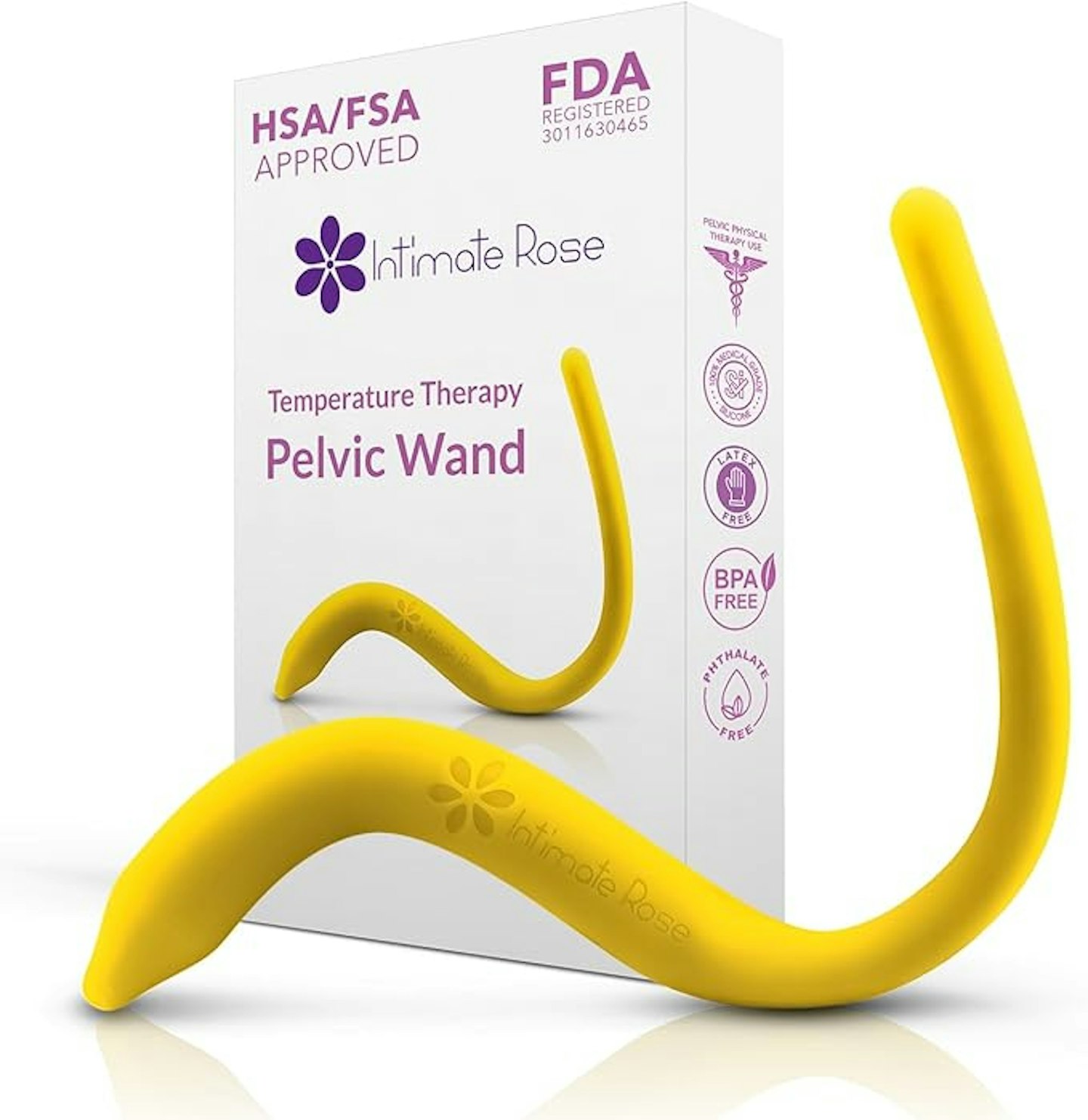 Intimate Rose/Amazon
Intimate Rose/AmazonWith its unique shape, this Intimate Rose Pelvic Wand can access the deep, hard-to-reach muscles that other pelvic floor trainers can't get to. The wand is made from firm yet soft silicone that is BPA and latex-free, so ideal if you are allergic.
The product comes with access to videos, articles and detailed instructions, so you can learn more about pelvic health as well as how to use the device. It’s particularly useful for helping with painful intercourse.
One customer said she noticed a difference after just one use, and many others have commented how quickly it produces results. It’s unusual shape makes for easier insertion, but it does go deeper than other pelvic floor trainers so may require a bit of trial and error as you learn to relax while using it.
Pros
- Includes access to videos, articles and detailed instructions on how to use it
- Designed by a doctor of pelvic physical therapy
Cons
- One reviewer thought it was hard to grip
FAQs
What is pelvic floor training, and how does it impact your health?
The pelvic floor refers to the muscles and ligaments to support your uterus, bladder, small intestine, and rectum. Pelvic floor training (also known as kegel training or exercises) is when you perform vaginal exercises to strengthen these pelvic floor muscles. As we age, our muscles become weaker, and this also takes its toll on our pelvic floor. The drop in oestrogen during the menopause can also result in these muscles becoming weaker, as the pelvic tissue becomes thinner and, therefore, weaker.
If your pelvic floor becomes too weak — also known as pelvic floor dysfunction — it can lead to pain in your pelvic floor, discomfort during sex, urinary incontinence and faecal incontinence. All of these can impact your quality of life and lead to a decrease in confidence, sexual difficulties, limiting movement, as well as causing rifts within relationships.
Although it can be difficult to talk about such an intimate health issue, or to seek help for it, it’s such a shame for your life to become narrower because of a weak pelvic floor, when so much can be done to remedy it. As well as pelvic floor exercises, regular exercise, particularly weight training, can really help strengthen these muscles and protect against stress leaks.
How to train your pelvic floor muscles
Working your pelvic floor muscles is a bit like pretending that you have to urinate and then holding it. Your thighs, buttock muscles, and abdomen should remain relaxed. Repeat each squeeze 10-15 times. When you get used to doing pelvic floor exercises, you can try holding each squeeze for a few seconds. Every week, you can add more squeezes, but be careful not to overdo it, and always have a rest between sets. After a few months, you should start to notice results. The NHS recommend that you keep doing pelvic floor exercises, even when you notice they're starting to work.
Practising yoga or giving Pilates a go can also help to keep your pelvic floor muscles toned. You can also use one of the pelvic floor trainers from our list to aid you with strengthening and tightening your pelvic floor, or even a tens machine. A tens machine uses electrical stimulation to target and activate the pelvic floor muscles, providing a more effective workout.
When you should see your doctor
Ask for help from your GP or nurse if you’re having trouble performing pelvic floor exercises, as they can give you tips on how to perform them the right way. However, it’s worth noting that pelvic floor exercises aren’t for everyone. If your pelvic floor muscles are always tight, these exercises can do more harm than good, as if you try to contract muscles that are already tired, they won’t be able to respond. Your doctor can help you figure out if this applies to you.
Why does the pelvic floor weaken?
Our pelvic floor muscles can weaken due to a number of reasons, including pregnancy and a shift in hormones as we age and go through menopause. Our vagina also changes with age – a decrease in oestrogen during menopause can result in thinning of the vaginal wall, resulting in dryness, which can make sex painful. The vulva also changes, and many women can suffer recurring urinary tract infections or thrush. Both of these conditions can make the very thought of intimacy with a partner unbearable, but there are things you can do to help.
Hormone replacement therapy is one option for restoring hormonal balance, while a healthy diet and regular exercise are also proven to help regulate hormone health. Using intimate care washes, creams or wipes can also bring relief, and UTI’s can be treated with antibiotics from your GP.
With one in three women experiencing leakages, doing some simple pelvic floor exercises can help to strengthen the muscles around your bladder and vagina in menopause which in turn can help you feel more confident, less worried about leaks, and also improve your sex life. You may find that simple exercises aren’t enough, though, which is where a pelvic floor trainer comes in.
What is stress incontinence?
Dr Masarat Jilani, the Selfcare Doctor, says, “If you leak when you cough, sneeze, exercise or laugh, this is called stress incontinence. First-line treatment for stress incontinence is pelvic floor exercises. Pelvic floor trainers are a fantastic way to help you do your pelvic floor exercises and can help you do them correctly. It is also helpful to join a group or community where you can work on pelvic floor exercises together. The Jude community is a Facebook group where people can share their experiences and also take part in monthly challenges to boost their pelvic floor/ bladder health”
Are pelvic floor trainers worth it?
You can strengthen your pelvic floor with or without a trainer. Exercises are freely available online, and you can simply focus on trying to stop yourself peeing (don't do this when you are actually going though as it can cause infection). However, what a lot of women find - and especially our testers - is that having a device helps you to not only remember to do the exercises but also helps guide you through what to do.
Dr Masarat Jilani is known as The Selfcare Doctor. She promotes sexual healthcare among women and is passionate about their wellbeing. She works extensively with pelvic health and function for post-natal and menopausal women.
Becky Fuller is a senior digital writer for Yours.co.uk. She is also a fully qualified personal trainer and strength coach, specialising in fitness and wellbeing for over 50s. Prior to joining Yours, Becky was a fitness writer for Saga, and a freelance entertainment and theatre journalist. Becky is passionate about helping people to move well and discover the many benefits of strength training.






